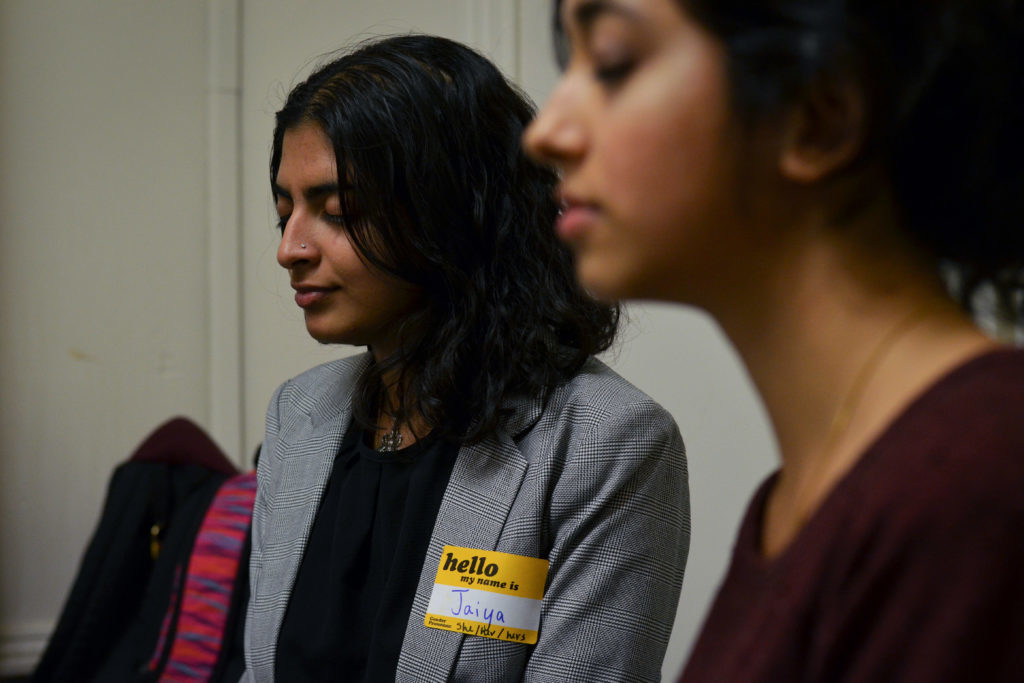Instead of staying in their residence hall rooms to pray, students now have a designated on-campus space for worship and meditation.
Seven faith-based groups debuted a room on the third floor of the Multicultural Student Services Center Friday for students to congregate for prayer or meditation. Student leaders said the room is a step toward improving religious diversity on a largely secular campus by allotting a central space where students can practice their faith or learn about other religions.
“There’s been a lot of issues with faith-based orgs and trying to be recognized on campus, so I think with the prayer space, that will help with getting faith-based orgs more recognition,” senior Bhavya Pathak, the former president of the Hindu Students Association who originally proposed the space to MSSC officials in January, said.
The space, which was funded by the MSSC, holds eight bookshelves – one for each faith – that are enclosed with a curtain to house religious texts, like Bibles and Torahs. Faculty in the religion department will also donate textbooks to the space later this semester, Pathak said.
The room features a waterfall and mats for students to use while praying. Student leaders said they also ordered decals of quotes related to each religion to tack onto the room’s walls within the next few weeks.
Pathak said members of HSA have been in conversations about the space for the past two years because there is no nearby temple for Hindu students to worship in D.C., making it difficult to celebrate holidays. After Pathak officially proposed the idea to officials in January, she contacted other faith-based groups to lay out what the space would include.
Students can reserve the space for events specific to their religion, hold general body meetings or read about other faiths in textbooks from the bookshelves, she said. She said students can also flip a sign on the front door to indicate if they want to pray by themselves or with other students.
Junior Jaiya Lalla, the HSA co-president, said that in the future, she wants the space to move out of the MSSC and into a larger campus space, like a room in the Marvin Center.
[gwh_image id=”1068391″ credit=”Isabella Brodt | Staff Photographer” align=”none” size=”embedded-img”]Religious objects are laid out on a table in the new prayer space on the third floor of the Multicultural Student Services Center.[/gwh_image]
Lalla said the lack of elevators in the MSSC and “restricted hours” make it difficult for students to access the building to pray on their own time. The MSSC is open from 9 a.m. to 11 p.m. from Monday to Thursday, 9 a.m. to 8 p.m. Friday and 4 to 11 p.m. Sunday. The building is closed on Saturdays.
Lalla said the space, which is advertised on student groups’ social media pages and through email blasts, is necessary for religious students – who “tend to be the minority on campus” – to congregate and understand each other’s faith.
“We realize that there’s a lot of faith organizations, but they all tend to be divided in their own little communities,” Lalla said. “We figured having the space would be an opportunity for everyone to come together and recognize that we all exist on campus.”
Michael Tapscott, the director of the MSSC, said he hopes the area will “draw attention to interfaith dialogue” among students, including those who are atheist or agnostic. Tapscott’s primary role in establishing the space was to ensure students had a place to pray so they would not have to travel off campus to worship, he said.
“Our hope is that each of these student groups or organizations or perspectives that come here will choose to use the space for good and for sharing and for educating others,” Tapscott said.
Victoria Lewis, the president of the Interfaith Council, said the prayer space was “crucial” to help the University accommodate students of all backgrounds and faiths.
Ten of the University’s 12 peer institutions, including the University of Southern California and Northeastern University, offer prayer spaces for religious student groups.
“It has been frustrating to us as religious students that there wasn’t a designated space here or a serious investment in religious diversity coming from the administration, so this is a really great first step to starting to advocate for faith-based orgs,” she said.
Senior Chloe Chang, the president of InterVarsity Christian Fellowship, said the new room will promote understanding of different faiths by allowing students of any religion to practice together. She said that on a relatively secular campus where religious students mainly find community in individual organizations, a prayer space allows students to worship without being distracted by roommates.
Before the prayer space, Chang said members of InterVarsity did not have a central place to pray, other than their residence hall rooms.
“We talk a lot about race and gender identity at GW, but I don’t think we talk a lot about religious identity,” Chang said. “We’re trying to move GW’s culture to a place where we can talk more about each other’s beliefs even if we don’t follow each other’s faith.”
Mohmeet Choudhary, the president of the Sikh Students Association, said he hopes the prayer area will bridge gaps in the understanding of different faiths. He said other students often do not understand his religion and he is often mistaken for being Muslim because he wears a turban.
“If you see these quotes and you see these pieces from other religions and what they mean to these people, I think it will expand your mind and open your mind to the possibility that it means something to someone,” he said. “That educational piece to who these different people are, it’s especially important.”
Gabby Pino and Madeleine Deisen contributed reporting.




